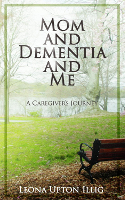
Image by Klaus Hausmann
“Denial is not a river in Egypt”
-- Comedians through the ages
Dementia is a disease that is responsible for about 250,000 deaths in the United States each year. I’m not a doctor, nurse, professional caregiver, physical therapist, emergency medical technician, or . . . well, you get the idea. I’m probably someone just like you.
When Mom and I started this journey, we knew nothing about dementia in general, or Lewy body in particular.
By the time our journey was over, I had been educated. I had gotten help. But the fact is, I wish I had known more about this disease and its effects right from the start. I might have avoided a lot of stress on my family, on me . . . and on Mom.
Mom Sailed Into Her 80s in Good Health
Not all dementias are alike, and my experience may not be like yours. Every situation is different, with a surprise lurking around every corner. But it doesn’t matter.
Mom sailed into her eighties in good health. She had the usual ailments (high blood pressure, high cholesterol, and type 2 diabetes), but they were all controlled with medicines with the help of our family doctor. Except for a bout with breast cancer when she was sixty-six (it was successfully treated with a modified radical mastectomy and medicine), and problems with ingrown eyelashes, she had no serious health problems.
She weighed about 110 pounds and had a good appetite, especially for oysters and hard crabs. We are serious Maryland seafood-eaters in our family.
Mom Knew That Life Is A Gift
Mentally and emotionally, we couldn’t have asked for a better mom. We went shopping together, ate out together, and discussed the soap operas together (As the World Turns and The Guiding Light were our favorites). Mom, my younger sister, Barbara, and I went on trips together. Later, my husband, David, and I took Mom on vacations with us. She enjoyed visiting Williamsburg, Virginia; it was a magic place for us. The holidays were spent at either our house or hers.
Two deaths in our family hit us hard. The first was the death of my dad from complications of heart problems, when Mom was 78. The second was the death of my sister, Barbara, from cancer, when Mom was 84.
These were terrible times. Mom, however, was strong. She was a survivor. She knew that life is a gift.
And she had an irrepressible sense of humor. For example: one afternoon Mom, Barbara, and I were watching television and the “dancing raisins commercial” came on. You know the one: a group of raisins comes dancing across the screen to the tune of, “I Heard it Through the Grapevine” by Marvin Gaye. Mom had never seen the commercial before. She started laughing and couldn’t stop, and from that time on, that commercial became part of our family folklore.
At this point you may be saying to yourself, “They seem to be watching a lot of television, don’t they?” Yep, that’s right! Mom watched a lot of television and enjoyed every minute of it. She also liked country music—the real singers, artists like Hank Williams and Patsy Cline. And polkas. Lawrence Welk was big at our house.
Did I mention that she was a farmer’s wife? After Dad died, Mom lived on our small vegetable farm by herself. She had plenty of space and fresh air. For many years, there were dogs on the farm: beagles, and rumors of beagles. She owned her own car, although by the time she had reached her early eighties she wasn’t driving much anymore. She loved her car, but she knew that her reflexes had dulled, and that it was better for her to stay off the road.
All this is by way of telling you: Mom, a sweet, strong person, lived pretty much a normal, happy life.
Denial Is Not a River in Egypt
We didn’t know anything about dementia or Alzheimer’s. Nobody we knew had those things. We were pretty confident, in fact, that those diseases only happened to other people. How wrong we were.
It’s easier than you might think to ignore the warning signs of a serious mental or physical illness. You don’t want to admit that anything is wrong with Mom, because if there is an illness, there could also be . . . death. You don’t want either of those. And if you allow for the possibilities that your mom might suffer, and that you might be left alone to face an unpleasant future . . . those aren’t the outcomes that you want, either.
If your mom is elderly, society can make it easy for you to turn a blind eye to serious symptoms.
“It’s only old age,” you say to yourself. Or, “Wasn’t Grandmom the same way?” Or, “These things happen to everyone at that age; it’s just that in the old days we didn’t talk about them or give them a name.” Right.
Early Stages of Dementia
Sometimes doctors, who are your lifeline when a serious illness strikes, aren’t much help, at least at first. Most types of dementia can’t be diagnosed until after death (I leave it up to you to decide whether this is good or bad).
In the early stages of the disease, tests can be given to patients to diagnose dementia, but these tests are not one hundred percent accurate. In addition, dementia in the early stages can masquerade as other ailments, and your doctor might prescribe supplements for vitamin deficiencies, or more water to combat dehydration. If you are lucky, these prescriptions will help, and your mom will get better. That’s the hope.
But . . . if the usual things don’t seem to have any effect, you may not be dealing with the normal effects of aging. You may be looking at the early onset of one of the many different kinds of dementia.
Below are some of the early warning signs that I experienced with Mom. If you detect these symptoms in your mom, it doesn’t necessarily mean that she has dementia. It does mean, however, that you should see a doctor and let her know what's happening.
Early Warning Signs That Mom Experienced
-
Dizziness, especially when getting out of bed in the morning, or when getting up from the commode.
-
Weakness in limbs, especially in the legs; having trouble getting up or sitting down, particularly in big, soft-cushioned chairs.
-
Change in gait: the walking pace slows, and the feet don't seem to be working together as they should; instead, they seem to be shuffling. Your mom may appear to step heavily on one foot, and lightly on her other foot, almost as if one of her legs were shorter than the other. When walking with someone else, she always seems to be two steps behind.
-
A significant change in eating, characterized by either constant hunger or no appetite at all, and sometimes alternating between the two. Although your mom seems to be eating all the time, she doesn't gain any weight.
-
Confusion: Confusing fictional events on TV shows with reality.
-
Inappropriateness: Talking about unusual, strange, or inappropriate subjects.
-
Delusions, confusion, or agitation.
-
Trying to hide physical and mental problems.
These were all warning signs that Mom had early dementia.
And I missed them all.
Copyright 2021. All Rights Reserved.
Adapted with permission of the author/publisher.
Article Source:
BOOK: Mom and Dementia and Me
Mom and Dementia and Me: A Caregiver's Journey
by Leona Upton Illig
 This book is the personal memoir of a daughter who discovers and tries to manage the onset of Lewy body dementia in her mother. Written in clear English by a layperson, it is not technical or scientific. Instead, it highlights the daughter’s own experiences and lessons learned?as well as mistakes?as she embarks on an unwelcome journey. The aim of the book is to help others who suddenly find themselves in the role of caregiver, especially those who have little training or experience with dementia patients.
This book is the personal memoir of a daughter who discovers and tries to manage the onset of Lewy body dementia in her mother. Written in clear English by a layperson, it is not technical or scientific. Instead, it highlights the daughter’s own experiences and lessons learned?as well as mistakes?as she embarks on an unwelcome journey. The aim of the book is to help others who suddenly find themselves in the role of caregiver, especially those who have little training or experience with dementia patients.
For more info and/or to order this book, click here. Also available as a Kindle edition.
About the Author
 Leona Illig is a fiction and nonfiction writer. Her fiction includes a children's book, The Elephant and the Bird Feeder, and a coming-of-age novella, Thumper: Life on the Farm. Her books, articles, and stories appear under the bylines L. Upton Illig and Leona Illig. She holds an associate's degree in elementary education and a master's degree in English literature. She is a member of the Maryland Writers' Association, the Eastern Shore Writers' Association, and others.
Leona Illig is a fiction and nonfiction writer. Her fiction includes a children's book, The Elephant and the Bird Feeder, and a coming-of-age novella, Thumper: Life on the Farm. Her books, articles, and stories appear under the bylines L. Upton Illig and Leona Illig. She holds an associate's degree in elementary education and a master's degree in English literature. She is a member of the Maryland Writers' Association, the Eastern Shore Writers' Association, and others.
For more information, please visit her website at www.threevillagesmedia.wordpress.com






















